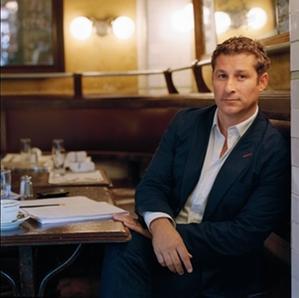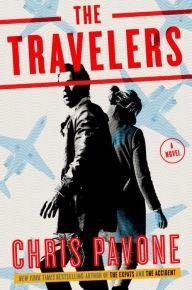
|
|
| photo: Nina Subi | |
Chris Pavone's newest thriller is The Travelers (Crown, March 8, 2016), following on The Expats, which won Edgar and Anthony awards, and The Accident. Pavone was a book editor for nearly two decades before moving to Luxembourg, where he started writing The Expats. He now lives again in New York City with his wife and children.
On your nightstand now:
A bound manuscript of Dodgers, a terrific debut by Bill Beverly; a bound manuscript of the newest novel by C.J. Box, with whom I'll be doing an event at the Poisoned Pen in Scottsdale, Ariz.; and an Insight Guide to Guatemala, where I'll be going with my kids for a multi-tasking combination of Spanish school, spring-break vacation and book-writing research trip. When I was growing up, my family spent all summer every summer traveling around Latin America, and while I've been back to Mexico a handful of times as an adult, I haven't set foot in Guatemala. I still remember it as the most beautiful place I've ever seen, and I'm excited to revisit it.
Favorite book when you were a child:
Treasure Island by Robert Louis Stevenson: pirates, treasure, adventure, betrayal. What more could a kid want?
Your top five authors:
David Foster Wallace, for his voice; Kate Atkinson, for the breadth of her ambition; Ernest Hemingway, for his layers; Donna Tartt, for her sentences; and Richard Price, for his dialogue.
Book you've faked reading:
I don't think I've ever fake-read a book. But I have definitely done the opposite plenty: pretended to have not read books that I had in fact read but didn't enjoy, especially those written by acquaintances. I've always been inept at pretending to like things that I don't, or staying silent about things I loathe. So instead I just say, "Sorry, haven't gotten around to it yet." Book you're an evangelist for:
Book you're an evangelist for:
The Northern Clemency by Philip Hensher. I write crime novels and read stacks of them, so I spend a lot of my time immersed in plots that dwell just on the far side of plausibility, with conspiracies and murders and convoluted cons, things that don't much happen in real life. But I've always enjoyed fiction that's hyper-real, with characters and dialogue and relationships and tensions that feel as true as real life itself, if not more so. The Northern Clemency is exactly that, beautifully rendered.
Book you've bought for the cover:
Remember the groundbreaking acetate cover for the original hardcover of The Secret History? Donna Tartt's book was everywhere--the big marketing, the large print run, the reviews--it was unavoidable. And I loved everything about it. Then a year or two later, I bought a completely different book because it too had a similar acetate cover. But it was awful.
Book you hid from your parents:
A novelization of the Warren Beatty movie Heaven Can Wait. I can't remember how I acquired the book to begin with, but I was pretty certain that my parents wouldn't approve of me devoting brain space to a novelization. I recently re-watched the movie, though, and it's terrific.
Book that changed your life:
When I was a young copy editor, I did some tiny bits of work on Pat Conroy's Beach Music, mostly making sure that the author's handwritten changes were legible; the manuscript went through a complicated revision. Over the course of a month, I had my pencil on those pages almost every day, with an open dictionary and style manual at my side. I also saw a lot of Pat. It was the first time in my life I'd ever spent much time with a successful novelist, and it opened my eyes to some surprising realities about writing, and working, and living.
Favorite line from a book:
"My mother is a fish," from Faulkner's As I Lay Dying. Point of view is everything.
Five books you'll never part with:
A tattered mass market paperback of Catch-22 by Joseph Heller, which I can open to any page, at any time, and love it. A hardcover of Infinite Jest, which David Foster Wallace signed during the publication tour. A pristine first edition of The End of the Affair by Graham Greene, which was a gift from my publisher upon publication of my first novel. The Catcher in the Rye by J.D. Salinger, which for so many years seemed to speak directly to me--to encapsulate everything that worried me about the world, about what my place in it might become. And most important, an untitled handmade book that my son Sam wrote when he was five or so. It's mostly pictures, and parts are a bit hard to understand, but it's definitely some sort of crime novel, starring a "bd gi" (bad guy) who says, "Ha ha ha!"
Book you most want to read again for the first time:
The aforementioned book by Sam. He's not the kind of kid who volunteers his work for anyone's approval, so my wife and I had to discover the book's existence by chance, on our own. I laughed for weeks. My life would be so great if I were somehow able to re-discover that book once a month, forever.

